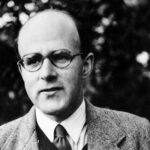Francois Englert is a Belgian theoretical physicist. He was awarded the Nobel Prize in Physics in 2013.
Life and Career
Francois Englert was born was born on November 6, 1932, in Etterbeek, Brussels, Belgium. He pursued his education in physics, earning a degree in physical engineering from the Free University of Brussels (Université libre de Bruxelles) in 1955. Subsequently, he completed his Ph.D. in physics in 1959 at the same university.
Englert’s career in physics was highly influential, particularly in the field of theoretical physics. He held various academic positions, notably serving as a professor at the Free University of Brussels. Throughout his career, he made significant contributions to the field of particle physics and cosmology.
One of Englert’s most groundbreaking contributions was in the field of particle physics. Alongside Robert Brout (who passed away in 2011), Englert proposed a mechanism, known as the Brout-Englert-Higgs mechanism, which explained how elementary particles acquire mass. Their work was published in a landmark paper in 1964, just before a similar contribution by Peter Higgs. This mechanism became a fundamental component of the Standard Model of particle physics.
This model predicted the existence of a particle, later named the Higgs boson, which was discovered at the Large Hadron Collider (LHC) at CERN in 2012. Englert and Higgs were jointly awarded the Nobel Prize in Physics in 2013 for their theoretical work in the discovery of the Higgs boson.
Award and Legacy
Francois Englert was jointly awarded the Nobel Prize in Physics in 2013 along with Peter Higgs. They were recognized for their theoretical proposal and prediction of the existence of the Higgs boson, a fundamental particle that gives mass to other particles. The Nobel Prize acknowledged their groundbreaking work on the Brout-Englert-Higgs mechanism, which has played a pivotal role in our understanding of particle physics and the structure of the universe.
His collaborative work with Robert Brout and Peter Higgs proposed a mechanism that explained how particles acquire mass. This mechanism, known as the Brout-Englert-Higgs mechanism, is a fundamental part of the Standard Model of particle physics and led to the prediction of the Higgs boson.
The theoretical framework established by Englert’s work has shaped modern particle physics. The discovery of the Higgs boson at the Large Hadron Collider (LHC) at CERN in 2012 confirmed the existence of the particle predicted by the Brout-Englert-Higgs mechanism.
The Nobel Prize in Physics acknowledged the significance of Englert’s contributions to the field, solidifying his place in the history of modern physics.
His work continues to inspire and guide further research in particle physics, influencing our understanding of the fundamental forces and particles that form the basis of the universe.
Tags: 6 November 1932, a Belgian theoretical physicist., Award for Francois Englert, Career of Francois Englert, FAQ on Francois Englert Francois Englert, Francois Englert, Francois Englert Birthday, Francois Englert Death anniversary, Francois Englert Observer Voice, Francois Englert's Birthday, Legacy of Francois Englert, Life of Francois Englert, Nobel Prize Laureate, Observer Voice Francois Englert, Tribute to Francois Englert











